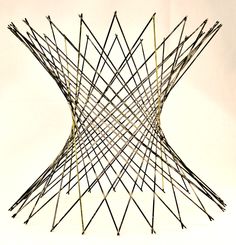 |
MAT 682 |
Prof. Claude LeBrun.
Office: Math Tower 3-108.
Office hours: TΘ 2:30--4:00 pm.
 |
MAT 682 |
Prof. Claude LeBrun.
Office: Math Tower 3-108.
Office hours: TΘ 2:30--4:00 pm.
This one-semester course will offer a self-contained introduction to self-dual 4-manifolds and their twistor spaces. Here self-duality is a conformally-invariant property on a Riemannian 4-manifold, roughly meaning that half of its conformal curvature vanishes. This special class of Riemannian 4-manifolds is intimately related to a special class of complex 3-folds by the Penrose twistor correspondence, where the conformal structure of the 4-manifold determines the complex structure of its twistor space, and vice versa. This abstract theory will be carefully illustrated through the exploration of numerous concrete examples.
The lectures will presuppose a basic knowledge of Riemannian geometry, roughly at the level of MAT 568. Some familiarity with complex manifolds, say at the level of MAT 545, could also be extremely helpful.
Grades will be based on attendance and class participation.
The Professor may be reach via e-mail by
.
This is the best way to request a Zoom meeting outside of normal
office hours.
Illustration:
Ruling lines on a quadric surface. The distinction between self-dual and anti-self-dual 2-forms is implicit in this picture.
Student Accessibility Support Center Statement.
If you have a physical, psychological, medical, or learning disability that
may impact your course work, please contact the Student Accessibility Support Center,
128 ECC Building, (631) 632-6748, or via e-mail at
sasc@stonybrook.edu.
They will determine with you what accommodations are necessary and appropriate.
All information and documentation is confidential.
Academic Integrity Statement.
Each student must pursue his or her academic goals honestly and be personally accountable
for all submitted work. Representing another person's work as your own is always wrong.
Faculty is required to report any suspected instances of academic dishonesty to the Academic
Judiciary. Faculty in the Health Sciences Center (School of Health Technology &
Management, Nursing, Social Welfare, Dental Medicine) and School of Medicine are required
to follow their school-specific procedures. For more comprehensive information on academic
integrity, including categories of academic dishonesty please refer to the academic
judiciary website at
http://www.stonybrook.edu/commcms/academic_integrity/index.html
Critical Incident Management.
Stony Brook University expects students to respect the rights, privileges, and property of
other people. Faculty are required to report, to the Office of Student Conduct and Community Standards,
any disruptive behavior that interrupts their ability to teach, compromises the safety of
the learning environment, or inhibits students' ability to learn.
Until or unless the
latest COVID guidelines
are explicitly amended by the university, disruptive behavior
will, during the Fall 2021 semester, be understood to include refusal to
wear a mask during class.
Further
information about most academic matters can be found in the University Bulletin, the
University Class Schedule, and the Faculty-Employee Handbook.